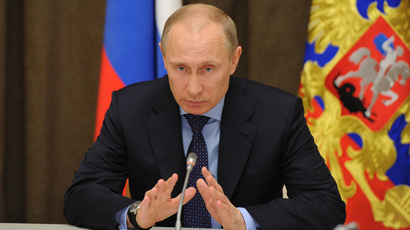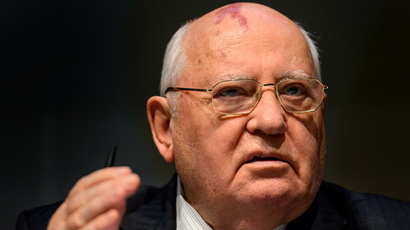Treaty to accept Crimea, Sevastopol to Russian Federation signed
Russia and Crimea have signed treaty of accession of the Republic of Crimea and Sevastopol in the Russian Federation following President Putin’s address to the Parliament.
Russia’s President Vladimir Putin requests parliament to ratify the agreement that would see both Crimea and the city of Sevastopol joining Russia.
“I ask you to consider the adoption of two new subjects of the Federation: Republic of Crimea and Sevastopol,” Putin told Parliamentarians.
#Crimea, #Sevastopol signing draft agreement on recognition as part of Russian Federation http://t.co/rZaaI5vQ8ypic.twitter.com/liF4ZntNH5
— RT (@RT_com) March 18, 2014
Crimea was represented by Prime Minister Sergey Aksenov and Sevastopol mayor Aleksey Chaly, who signed the treaty. The two were accompanied by Crimean top official Vladimir Konstantinov.
“Since the adoption of the Russian Federation Republic of Crimea in structure of the Russian Federation two new entities - of the Republic of Crimea and the city of Federal importance Sevastopol – have been created,” the text of the treaty reads.
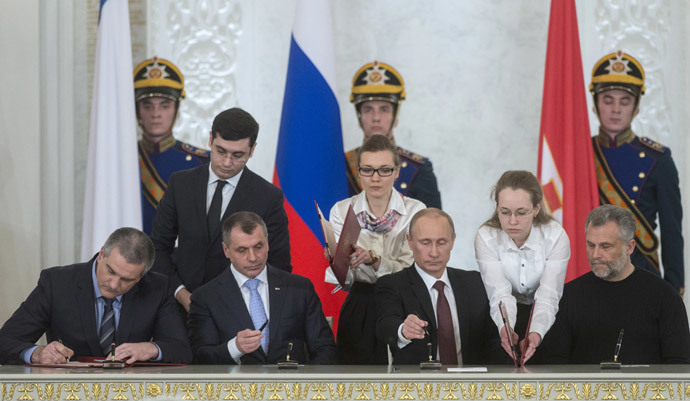
The Treaty enumerates 10 articles which will come into effect after ratification.
Russia will guarantee that the people who live in Crimea and Sevastopol will be given the right to keep their native language as well as the means and conditions for learning it.
Thus, article 3 of the treaty stands that there will be three official languages in Crimea and Sevastopol: Ukrainian, Russian and the language of Crimean Tatars.
Starting from the day of accession, the people of Crimea and Sevastopol are considered as Russian citizens, according to Article 5.
As it was agreed, the transition period will be acting till January 1, 2015. During this time, both sides will resolve the issues of integration of the new subjects “in the economic, financial, credit and legal system of the Russian Federation.”Crimea has already officially introduced the ruble as a second currency along with the Ukrainian hryvna, which will remain an official currency until January 1, 2016.
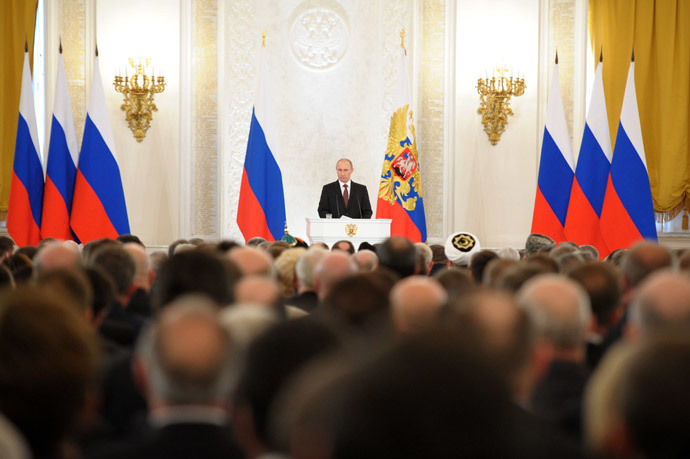
National elections to the state bodies of the Republic of Crimea and Sevastopol have been slated for September 2015.
Until then the now acting Parliament of Crimea and the Council of Ministers of Crimea as well as the Legislative Assembly of the city of Sevastopol will continue their work.
The document will be sent for approval to the constitutional court, and then to ratification in the parliaments of Russia and Crimea.
Russian lawmakers will meet with a parliamentary delegation from Crimea and Sevastopol on March 19 to review strategic aspects of cooperation, including "the prospects for the political and financial establishment of the Republic of Crimea."
"A number of lawmakers will meet with our colleagues from Crimea and Sevastopol at 10:30 local time (0630 GMT)," said the speaker of the lower house of Russia's parliament, Sergey Naryshkin.
Treaty signing came after President Putin’s address to the Federal Assembly.
Putin stressed that the results of the referendum, in which more than 83 percent of Crimean residents came to polling stations and more than 96 percent of those voted for rejoining Russia, leave no room for equivocation.
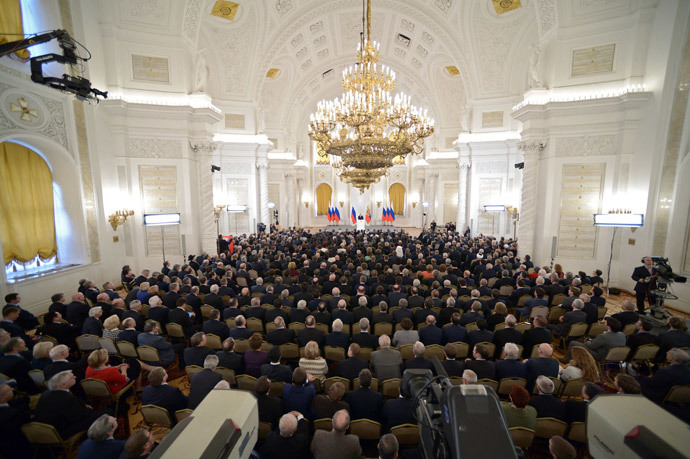
The referendum on independence in Crimea was conducted in strict accordance with democratic principles and international law, he pointed out. He dismissed criticism of the Crimean referendum, citing Kosovo’s unilateral declaration of independence as an example of self-determination praised by the West.
The president recalled the history of Crimea, saying its cultural, religious and spiritual ties bind it with the peoples of Russia, Ukraine and Belarus, which explains the attitude Russians have towards the peninsula.
"There are graves of Russian soldiers on the peninsula whose courage enabled Russia to make Crimea part of the Russian Empire in 1783," Putin said. "Russians, Ukrainians and Crimean Tatars and other peoples lived side by side in Crimea preserving their originality, traditions, language and religion."
He said Crimea had dark pages in its past, particularly the persecution of Crimean Tatars and other minorities in the USSR. The authorities of Crimea seek to recompense for those ills.
"There was the period, where the Crimean Tatars experienced injustice· It is necessary to adopt political, legal measures to finalise the process of rehabilitation of the Crimean Tatars. The measures should restore their rights, their good name fully," Putin said.
One such move would be accepting the language of Crimean Tatars as an official language in Crimea on a par with Russian and Ukrainian.
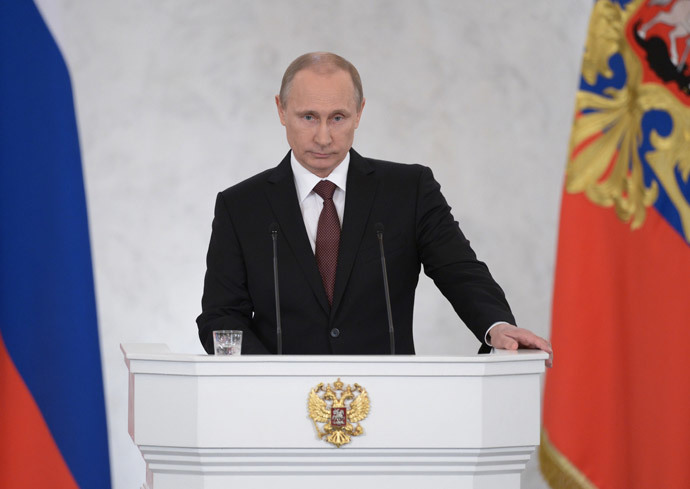
Putin lashed out at former Soviet leader, Nikita Khrushchev, under whose rule Crimea was attached to Soviet Ukraine without any regard for Crimeans’ wishes and in violation of the laws of the time.
Crimean separation from Russia was reinforced again after the split of the Soviet Union, Putin said. This could be partially blamed on Moscow too, as it hailed the so-called “parade of sovereignty” of the Soviet Republics.
Russia has since respected the results of the USSR’s dissolution, including Crimea being part of Ukraine.
Russia’s position was based on the assumption that Ukraine would remain a friendly partner respecting the historic ties between the two countries. Russia continues and will continue to view these relations as very important, the president said.
Putin criticized several governments in Kiev for neglecting average Ukrainians, seeing the country as a source of profit.
He said he sympathized with Ukrainians who took to the streets of Kiev in protest against President Yanukovich, whom they saw as profoundly corrupt.
But the current authorities who replaced Yanukovich after an armed coup are to a large degree controlled by radical nationalists, Putin stated.
Those same radicals have voiced threats against Ukrainians who resist their rule, particularly those living in Crimea.
Turning a blind eye to those threats and the moves of the current authorities, which violated the rights of ethnic Russians in Ukraine, would be betrayal on the part of Russia, Putin said.













